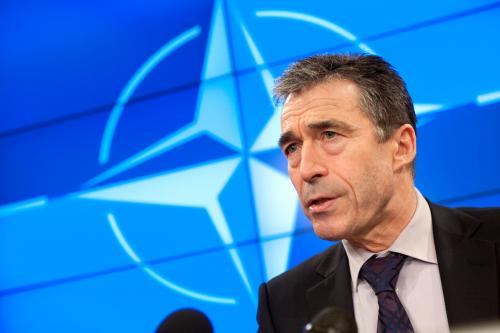
As NATO and its constituent states sort through the conflicting policy goals and logistics of the mission in Libya, some members of the Atlantic Council Strategic Advisors Group have offered some insights.
What is the coalition’s endgame in Libya? There is considerable ambiguity about the ultimate endgame of coalition operations in Libya. The coalition military mission – to protect civilians in Libya and enforce UNSC 1973 – is not congruent with the political goals of Presidents Obama, Sarkozy and others that Colonel Gaddafi must leave power. What should be the end game of the coalition in Libya and what military/political means should be put toward that end? Can and should the coalition – or members of the coalition – take action that goes beyond UNSC 1973 to aid the rebels or take more active measures to bring about regime change?
Jean Paul Perruche:
The wishful endgame is the establishment of a democratic state in Libya but we know that it will take time and result of the Libyans Will. Therefore, the role of the international community can only consist in playing a facilitator and supporting role.
The US Administration and like-minded governments supporting military operations against Libya have repeatedly affirmed that they are acting on the basis of and within the authority of the UN Security Council resolutions imposing an arms embargo and protecting the civilian population. At the same time, they have also said that the Gaddafi regime has lost its legitimacy and must leave power.
Critics in the US have complained that US policy is unclear or even contradictory. Such criticism confuses the limited international consensus–to use military means to block the Gaddafi forces from further attacks against the civilian population–with the broader intentions of Western policy–to use a variety of political, economic and financial instruments to bring about political change in that country.
The military campaign now underway is a necessary element to achieve political change but not a sufficient one. It may turn out that air operations will tip the balance of power on the ground to the extent that anti-Gaddafi forces will be able to take and hold the bulk of Libyan territory outside Tripoli; it may also happen that regime forces will be able to hold much of western Libya, creating a de facto partition. What will be important beyond the results of ground fighting is how influential members of the regime think and behave in the face of determined international pressure.
The experience in Kosovo is often misrepresented as a cautionary tale about the weaknesses of coalition warfare or of the limits of air power; more accurately, the Serb decision to give up and to leave Kosovo demonstrates what can happen when the use of military force is vigorously reinforced by diplomatic, economic and other pressures. Serb forces were not defeated in detail on the ground–the US and other NATO nations did not deploy ground forces. Instead, Milosevic found himself isolated in the region and under pressure from senior business and political sectors at home, which ultimately led to his ouster and detention in The Hague.
Further, claims that the no-fly zones in Iraq were not successful overlook the breathing space that the Kurds gained to re-group and to lay the basis for post-Saddam life. Accordingly, it is way too early to conclude that current US and Western policy is failing; what is needed is not self-fulfilling pessimism but more determination and creativity on how to further isolate and squeeze the pro-Qaddafi elements in Tripoli, forcing them toward the eventual decision to throw him under the bus (of off the boat) in order to protect themselves."
Ioan Mircea Pascu:
UNSC Resolution 1973 is has a degree of vagueness, so as to allow the coalition members to move freely in meeting those particular national interests.
The truth is that, for a variety of reasons, some coalition members were more interested than the others to see the military operation started. That is the main reason why its final aim is not clear: it could either be to deny Gaddafi the capacity to harm his own people– as exclusively permitted by the UNSC Resolution and would practically stop the current waive of revolt and its unpredictable consequences–or it could be to oust him–as indicated by both European and US leader –(and thus give a jolt to the same waive, in spite of all those unpredictable consequences.
Michael Durkee: While academic works (Clausewitz and successors) usually argue that the definition of strategic objectives should be decided before military actions are launched, there is much history, going back to World War II, showing that even close allies only agreed on their ultimate objectives well after the start of military operations, e g the US-UK agreement at Casablanca in 1943 for unconditional surrender of the Axis powers, or the agreement in April 1999 on NATO objectives in Kosovo, after the air campaign had started in March. Accordingly, while it would certainly be preferable for coalition leaders to have defined their strategic objectives in Libya before starting air operations, history shows that military campaigns can adjust and be successful even when their overall purposes are defined later–so long as the coalition members remain united.
Jean Paul Perruche is Research Director of IRSEM-Paris and former Director-General of the EU Military Staff. Ioan Mircea Pascu is a Member of the European Parliament and former Romanian defense minister. Michael Durkee is a retired Senior Foreign Service officer who served as political advisor to four SACEURs.
Image: nato-libya-rasmussen.jpg
